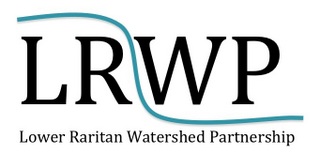Article by LRWP intern Daniel Cohen
During this semester, as part of my internship, I am conducting interviews with members of organizations which work in partnership with the LRWP. The common goal of the LRWP and its partners is to improve the natural environment of the region. I recently met with Nicole Wines who resides in Highland Park in order to discuss the Raíces Cultural Center and the Raíces Eco-Culture program. Nicole, a co-founder of Raíces, has been with the organization since it was established 10 years ago. The mission of Raíces is “to preserve cultural roots through the arts, history and ecology.” One of its goals is to utilize the performing, visual, and media arts in order to promote environmental awareness.
According to Nicole, one’s cultural values should be in harmony with a lifestyle which respects and restores the natural environment. Raíces understands that in every culture there must be a focus which sustains the earth’s ecosystems. It is through an appreciation of the arts that this fundamental bond between humans and their natural world is to be celebrated and encouraged. This “eco-culture” approach is what motivates those who work and volunteer for Raíces.
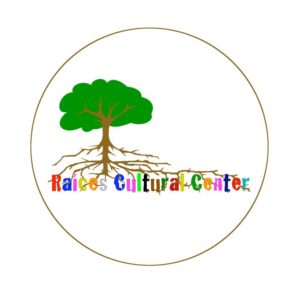
Raíces Cultural Center and the LRWP collaborate on various projects on the path to their common objective: an eco-friendly Central New Jersey. Both groups are committed to sustainable regional ecology, however the groups have not worked together on stream clean-ups. Raíces believes that participating in occasional environmentally friendly acts such as voluntary clean-ups of watershed sites, while helpful to some extent, are insufficient. Instead, Raíces advocates that attention be given to studying and learning from the indigenous peoples of the Caribbean and other regions whose lifestyles are based on an inherent respect for the natural world. The group has determined that it is through understanding environmentalism and the arts that the wisdom of indigenous societies can be combined along with the technological advances of the so-called “developed world.” Through arts programs, all individuals, youngsters as well as adults, can appreciate the importance of environmental sustainability. According to Nicole, excessive consumerism which encourages waste and pollution, should be replaced by the values of those indigenous peoples who respect the environment.
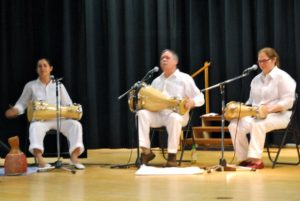
Nicole Wines, far left, performing on traditional drums
As an example of the group’s commitment, volunteers from Raíces, including Nicole, traveled to Puerto Rico to assist those who endured the catastrophic effects of Hurricane Maria. In Aguada and San Sebastian, Raíces repaired roofs. The group also replaced the Agrabond cover for a tunnel at Finca Mi Casa in Camuy. Volunteers provided packets of organic and non-GMO seeds to community gardeners, homeowners, farmers, schools, as well as to organizations which promote sustainable agriculture. Raíces distributed herbal medicines, organic teas, solar lights, and water filters. In Phase 1 of the group’s Disaster Relief Support Initiative, Raíces raised over $10,000 to support recovery efforts.
Nicole believes that in future years, inhabitants of regions beyond the Caribbean, including those living in coastal areas of the United States, must become proactive regarding extreme meteorological events. Nicole is aware of the environmental challenges which confront the Lower Raritan Basin. Run-off from nearby lawns and industrial sites pollute the watershed with chemical fertilizers and industrial waste. The proliferation of trash is an ongoing problem. Invasive fauna and flora must be replaced by species which are native to the area. Rain gardens should be established in buffer zones adjacent to the Raritan River which can address excessive run-off. Residents of Central New Jersey as a result of Raíces and the group’s environmental arts programs better understand the need to restore our treasured watershed. For more information on Raíces and their work and programs: https://www.raicesculturalcenter.org/.
Article and photos by Francisco Gomez, Founder and Director of Raíces Cultural Center, a non-profit organization dedicated to preserving cultural roots through the arts, history and ecology.
With many thanks to Francisco and the Raíces Cultural Center for joining us for our February 25 clean-up of the Raritan River floodplain in Piscataway.
We headed out for Johnson Park last Saturday for a river clean-up of the Raritan. There were about a dozen people gathered as we were given our trash bags and long reach garbage grabbers to tackle the debris.
I often take my daily walks along the river, especially during the Spring and Summer. There’s always been something special about the water, as polluted as it is, wildlife and the people that are out doing what I do to get my daily dose of Nature.
Having walked the river ever since I was a kid, and let me say many moons have passed since then; I have witnessed the gradual environmental destruction of this once great water way.
As a child growing up in Perth Amboy, I would hangout on Mechanic St. with my friends. We would walk to the waterfront and dive off of a dock at the end of Buckingham Ave., adjacent to the Chevron Oil Refinery. At the end of the dock there was moored an old World War 2 mine sweeper that we would explore when we weren’t swimming in the entrance to the Arthur Kill and across the Raritan Bay to Staten Island. That was the early 1960’s and the water was still good enough to swim. At some point in 1961 we noticed oil spots on our skin when we came out of the water, and we reeked of petroleum. Needless to say, we stopped swimming in the bay and that wonderful part of our childhood came to an unwanted end. It would be many years later, when I became involved in the environmental movement, that I fully understood the negative impact of what corporate greed and indifference to Mother Nature had done and is still doing.
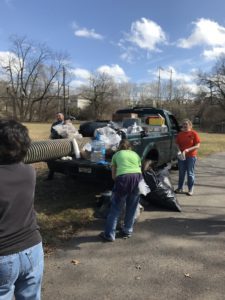
As our crew scoped out the coast line for garbage, a sudden sadness and anger overwhelmed me at the same time. It brought to mind a commercial clip made back in the early 1970’s of a First Nation’s man who rows down a river in a canoe, and as he gets into the greater water way he begins to see the incredible amount of garbage thrown into the river by humans. He also sees all the petrochemical companies spewing toxic waste from their chimney stacks and the pipelines from their factories that drain into the bay. When he gets out of his canoe by a highway, one of the cars passing by tosses a bag of fast food that lands at his feet. As he turns towards the camera you see a tear roll down his cheek. The actor’s name is Iron Eyes Cody, but what he was seeing was no act!
As we continued our sweep of the coastline I understood fully what our disregard and disrespect for Nature has produced. Just attempting to clean-up the vast amount of debris in one minuscule patch of river line was daunting and seemed totally futile; I believe this is what made me so angry. I know that I’m not without blame, for I have also contributed to this catastrophe in one way or another, directly or through the forced machinations of the corporate Matrix.
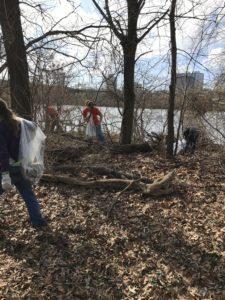
Enter the Lower Raritan Watershed Partnership. This is the organization who coordinated the river clean-up and does the remarkable work of attempting to protect the Raritan River. These guys do everything from stewardship, civic science and environmental monitoring, habitat and ecological health, Eco-art and, of course, lots of clean-ups.
Two hours later we had collected a number of bags filled with trash, a bicycle, one or two huge plastic tubes and a very heavy corroded metal lid. The truth is we barely made a dent in our clean-up.
Volunteering to be part of these clean-ups can be quite disheartening and almost pointless because of the amount of new trash that is dispensed onto the landscape and into the river each day. However, one should not be deterred from joining in to do this most important work. There is some recompense in watching a jogger or cyclist pass by, smile and thank us for collecting what seems to be a very small amount of garbage. There is satisfaction in cleaning up other people’s carbon footprints, even if you may not believe so.
So if you’re so inclined and want to do your part to make the environment a little more ecologically balanced, then come out on one of the workdays and get a little dirty so we can make the Raritan River a little cleaner again – you won’t regret it!
